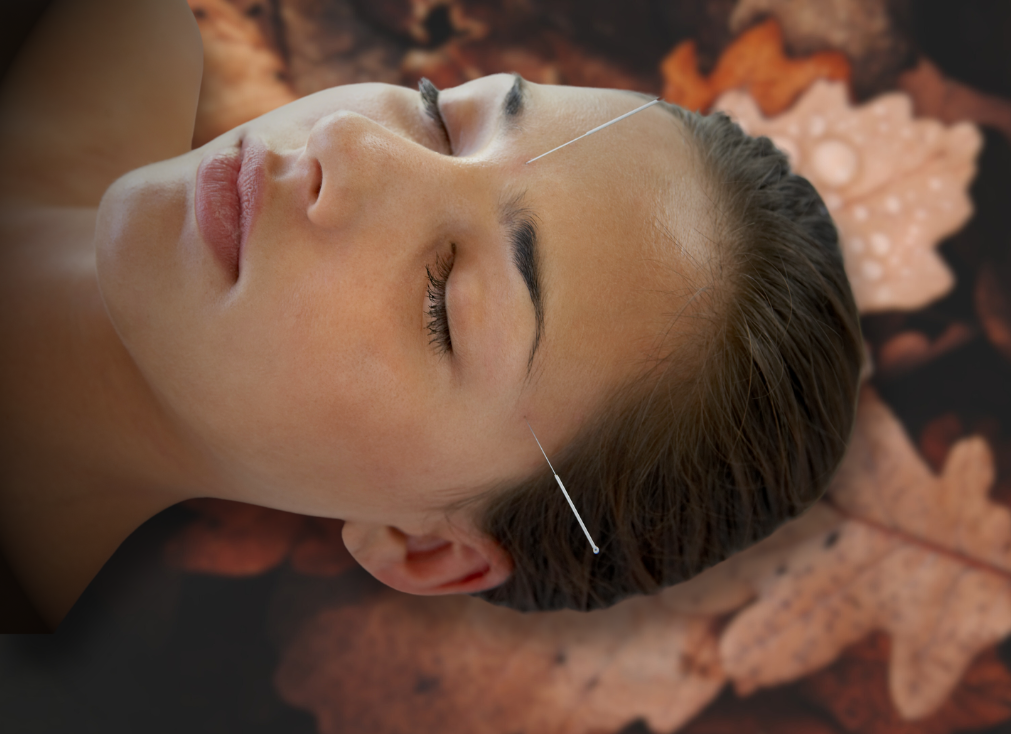
“Facial Acupuncture offers a natural alternative to Botox with long-lasting benefits. Acupuncture focuses on overall skin health and rejuvenation from within, targeting various skin concerns beyond just wrinkles caused by aging.”
- Maria Hogan

It’s Time…
Acupuncture, a traditional Chinese medicine practice that involves inserting thin needles into specific points on the body, has gained recognition for its therapeutic benefits. As the seasons change, particularly from summer to fall, our bodies often experience shifts in energy levels, immune function, and overall well-being. The transition to fall can bring about various health challenges, such as allergies, colds, and seasonal affective disorder (SAD).
Boosting Immune Function
One primary reason acupuncture is vital in the fall is its ability to enhance immune function. As temperatures drop and people spend more time indoors, the likelihood of catching colds and flu increases. Acupuncture stimulates the production of white blood cells and enhances circulation, which can help bolster the immune system. Studies have shown that regular acupuncture treatments can lead to fewer instances of illness during colder months by promoting better overall health.
Addressing Allergies
Fall is notorious for seasonal allergies caused by ragweed pollen and mold spores. Many people suffer from symptoms such as sneezing, nasal congestion, and itchy eyes. Acupuncture can relieve these symptoms by reducing inflammation in the nasal passages and balancing the body’s response to allergens. Research indicates that acupuncture may help alleviate allergic rhinitis symptoms effectively without the side effects associated with conventional medications.
Managing Stress and Anxiety
The transition into fall often changes your routine—children return to school, work schedules become busier, and daylight hours decrease. These factors can contribute to increased stress and anxiety levels. Acupuncture has been shown to promote relaxation by stimulating endorphin release and regulating neurotransmitters like serotonin. By incorporating acupuncture into a wellness routine during this season, individuals may find it easier to manage stress levels and improve their emotional well-being.
Combating Seasonal Affective Disorder (SAD)
As daylight diminishes in the fall and winter months approach, many people experience Seasonal Affective Disorder (SAD), characterized by feelings of depression related to seasonal changes. Acupuncture may serve as an effective complementary treatment for SAD by helping regulate mood-enhancing hormones such as serotonin and dopamine. Additionally, acupuncture sessions can create a calming environment that encourages mindfulness and relaxation—important factors in combating depressive symptoms.
Promoting Digestive Health
With fall comes an abundance of harvest foods rich in fiber, but heavier meals can also lead to digestive discomfort for some individuals. Acupuncture can aid digestion by improving gastrointestinal motility and reducing bloating or discomfort after meals. It helps balance digestive functions through targeted points that correspond with various organs involved in digestion.
Embracing Acupuncture This Fall
Acupuncture offers numerous benefits during the fall season, including enhanced immune function, relief from allergies, stress management, support against SAD, and improved digestive health. Integrating acupuncture into your self-care routine this autumn allows you to navigate seasonal changes with greater ease while promoting overall well-being.
Sponsored Links
About the Author

Maria Hogan
Maria Hogan is a Licensed Acupuncturist and Massage Therapist. She graduated with a Masters Degree in acupuncture from the New York College of Health Professions, where she currently is a Professor and Supervisor to students in the Massage Clinic.
Maria is passionate about sharing the healing benefits of Chinese Medicine.
Believing the body should be treated as a whole, she uses many modalities to treat various conditions.










